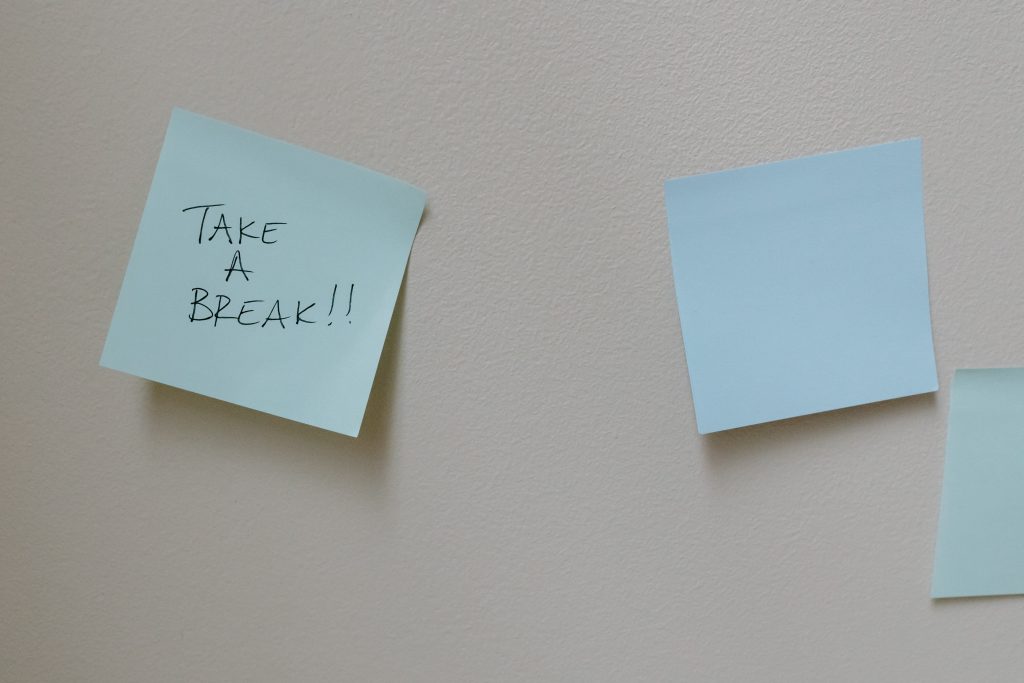
Forgetting keys? Appointments? Always leaving tasks unfinished?
Sound familiar?
Being scatterbrained is not fun but it is common. Moms are no exception. The chaos of motherhood can make scatterbrain worse and difficult to manage. How to know you have scatterbrain?
You might have scatterbrain if…
- You to do too much at once.
- You jump from one task to another leaving them unfinished.
- You are easily distracted and have difficulty saying no or passing up a task.
- Your mind is always running on overdrive. You’re wired and have a hard time slowing down.
Don’t just accept it as being a normal part of motherhood. Keep reading to learn what you can do to prevent or reduce a scattered mind.

1.Know your distractions
Some distractions can be sneaky. At the end of the day, you might be thinking, “How did I accomplish so little today?!” Sometimes it’s those sneaky little distractions that get in the way of getting stuff done. They all add up!
A good way reduce the number of little distractions that add up to big setbacks, is to identify the types of distractions that occur so you can be prepared.
There are two main types, Physical and Mental.
Physical distractions – Anything from your environment (home, work, outside running errands).
Mental distractions, like ruminating a negative experience you had earlier in the day.
Managing these distractions are easier when you identify them. Here are some ways to reduce distractions so you can finally focus.
1.Find and secure distraction free environments
You can’t have a 100% distraction-free environment, all the time. But you can secure one for tasks where you know you will need it.
2.Plan your day in advance
Not being prepared for the day can leave you vulnerable to unclear thinking and difficulty prioritizing tasks.
3.Use a Journal to write down nagging thoughts
Get it all out on paper. If you don’t, they will continue to stay on your mind making it difficult to focus on what matters.
4.Eliminate the distraction
For example, if you receive a lot of text messages or social media updates it’s a good idea to turn off your phone or put it to airplane mode.
You might be interested in: 13 Practical Strategies to Stop Your Kids From Interrupting You.

2.Be aware of your habits
Sometimes being scatter-brained is a result of our bad habits and you might not be aware of it. It’s a good idea to find any behaviors that could be causing you to feel scattered on a regular basis.
Take a look at your morning routine. Does your day always start off on the wrong foot?
Changing up your routine can yield some positive results. At the end of the week, assess the changes you made. Is getting stuff done, taking less time than they did before? Are you feeling mentally clearer?
If the result is positive, stick with it.

3.Use a timer for better concentration
If you are always checking your watch or glancing at the clock, then you are stressing about time. That will not help ease a scattered mind and it won’t magically give you more time either.
Use a timer to set a reasonable block of time for your task to prioritize and focus on. No need for a fancy gadget or app. A simple kitchen timer will do, or you can use the timer on your smart phone.
It might sound counterintuitive but using a timer can help you worry less about time, allowing you to focus. When you don’t set a block of time for a task it will be difficult to gauge the time you have. So, you might think you have less or more time than you really have.
You may not be able to finish at the end of the timer. That’s okay. Set another timer to finish the job if needed. If you are resetting the timer multiple times, it might be a good idea to step away from the task to take a break.
It’s worth giving it a try if you find yourself struggling to finish a task. A timer can help you stick to your tasks giving procrastination the boot. Save yourself the uncertainty, set a timer for one task and get it done.

4.Take regular breaks
Taking breaks can refresh your mind and rebuild your focus. Take a short walk, stretch, close your eyes, or listen to some calming music.
Make personal downtime a priority. It will energize you, help you be more productive and improve attention span.
True downtime is not watching TV or scrolling social media. Ideally you want to take a short nap, meditate, listen to calming music, or simply closing your eyes can help. True downtime should make you feel refreshed instead of more tired or stressed.
Taking breaks does not mean you are being lazy or procrastinating or using it as an excuse to not get stuff done.
I know it can be easier said than done when you’re a busy mom, but your brain health matters.
Don’t forget to take breaks and never feel guilty about it.
What to know what Self-Care is really all about? Read The Real Reason You Struggle with Self-Care as A Mom.

5. Avoid multitasking
Studies have shown that multitasking isn’t efficient. How you do tasks impacts the way your brain functions. If you were multitasking (doing too many tasks at once), do you think your brain would be clear and focused? No, of course not.
Of course it depends on what task you are doing. I’m not talking about low focus tasks that don’t require much attention. Examples like brushing teeth, wiping a kitchen counter, folding laundry, walking, or drinking coffee. These are a few examples of low focus activities where you can multitask with other low focus activities.
You should avoid multitasking any time you are doing tasks that require focus. In this case, concentrate on that task first before you move on to something else.
Being a multitasking mom is not a badge of honor. For a long time, multitasking has been given an unfair praise. Here are just a few ways multitasking can affect you…
- Creates more stress and anxiety.
- Reduces productivity.
- Reduces attention span.
- Affects your memory.
- Causes you to make more mistakes.
Don’t buy into the multitasking myth!

6.Write it down and do a brain dump
Write down what’s on your mind, every single day.
No need to write multiple pages, worry about neatness or esthetics. You can write point form, use key words, questions, anything that’s been on your mind you don’t want to forget.
Keep your writing in a safe place so it doesn’t get lost and that you can easily access it later.
You might be filling at the brim with ideas and/or plans. If so, don’t hold back. Write it down!
Ditch the To-Do List: 3 Simple Methods to Help You Be More Productive

7. Keep it simple
What does keeping it simple really mean? It means doing less, not more. This is important if you feel pressure to do more because maybe you feel doing more equals being better mom. Not true!
Doing less is eliminating all the unimportant things that are weighing you down and making you miserable.
What are some examples of this you might eliminate?
Spending too much time on social media, cleaning up after family members that can do it themselves, buying stuff you know will sit in a closet or storage, or answering a text or email immediately when receiving it.
These are just some examples of things you can eliminate or at least reduce.
Keeping it simple is about doing what matters and making the weight of life a little lighter.
It might feel strange to do less but I challenge you to give it a try. I give you permission to do less. Forget about feeling like you have to do more.
Consider doing less so you have more mental energy and are able to do what matters.

8. Slow down
You might feel like you need to be in a hurry otherwise you won’t get anything done.
Sometimes pressure can give us the motivation we need. On the flip side, it can result in avoidable and costly mistakes.
Think about a time when you rushed into a task. Did you make a mistake that cost you? Whether that cost be time, health, or opportunity?
When you rush through the day, it can set you back if you’re not careful.
"Moving fast is not the same as going somewhere" - Robert Anthony

9.Deal with what's on your mind
Mental baggage can affect focus and mental clarity big time. If you have a problem that’s been on your mind, deal with it ASAP.
It will drain you of energy, have you stuck in a negative headspace for days or more.
Talk to a trusted friend, family member or therapist. Keep a journal handy to write down thoughts and feelings that are nagging you.
You might be interested: Journaling Basics: what You Need To Know To Get Started and To Stick To It.

10. Use the STOP trick
This is a mental trick to help you get through any stressful situation or task you are struggling to complete. Using this technique can be helpful to clear a scattered mind too.
S = Stop
Stop what you are doing and take a pause.
T= Take
Take a deep breath and try to be mindful of your breathing.
O= Observe
Observe what is happening. Observe your thoughts and feelings. Be aware of what’s happening with your body and mind.
P= Proceed
Proceed or not proceed. You have a choice here, decide whether it is worth continuing. This process can help you discover what’s working and what isn’t.
The key here is to practice being mindful and aware of your actions. It’s definitely worth the minute or two to determine if what you’re doing is worth your time.

11.Planning ahead
Plan your day, week, and/or month, so you don’t have a load of tasks hanging out in your mind. You’re not a computer, so grab your planner and plan it out.
Prioritize important and urgent tasks first. Set a goal for the day, week, month or even year (You never plan too far ahead!).
With good planning, you will have a better sense of control and a clear outline of what you want to accomplish.
Ditch the To-Do List: 3 Simple Methods to Help You Be More Productive

12.Engage in creative activities
Tapping into your creativity can help restore your focus and relieve stress. It’s a worthwhile self-care practice with many creative activities to choose from.
Choose one that you gravitate towards and carve out some time in your schedule to do it.
If you’re not quite sure what to try, adult coloring books are a good place to start. They’re easy, fun and therapeutic.
If you’re not into coloring, you can try creating a vision board instead. A vision board can improve your mood and motivate you to pursue your goals. It’s another easy way to explore your creativity and do something just for you.

13.Exercise
There are many health benefits of exercise, and it doesn’t have to be a 1 hour long sweat session to get them. If you are short on time, exercise in bursts. Five minutes here and there should do the trick.
Exercise is such a vital part of overall health. It can boost mental clarity and recenter your focus.
Ready to prioritize your health and need some motivation? Getting Fit: 11 Simple “No Excuses” Strategies for Busy Moms.

14.Keep it organized
Keep your home and work environment clear of clutter. A cluttered space can be distracting and stressful.
Take a few minutes every week to clear a zone in your home or workspace that is bothering you the most.
Physical clutter is also mental clutter. It takes up space in your mind just as physical clutter would take up space in your home.
The effort to clear the clutter is worth it. Your space should be functional and enjoyable to be in. If it isn’t, now is a good time to start.
It’s is true when they say “A clear space is a clear mind”. Keeping your home or work environment clutter-free should not be daunting. I have some doable steps to a clutter free space you can find here.
Read How to Declutter Your Home for Better Mental Health Comes with Free printable, for tips and how to get started so you can reclaim your space and sanity.
15. Track your focus with a habit tracker
Track your habits and rate your focus daily. Reflect on the day as you are winding down for the evening.
When you track, you learn a lot about yourself. When you track, you have complete control over your outcome.
Some days can be so chaotic it can be difficult to know what caused you to lose your focus. That’s why tracking is so helpful.
Losing focus is why you struggle to get stuff done. Tracking is one effective way to get to the source of the problem. Knowing is the only way to make changes to correct it.
A habit tracker is a great tool for moms to improve and build better habits.
I have a simple habit tracker for you to use to build better habits, one day at a time.
You might be interested in: How Moms Can Break Bad Habits Without the Overwhelm.
Having a scattered brain is normal sometimes but not if it’s an everyday occurrence.
You can manage it using these tips and strategies. Simplify as much as you can, take needed downtime and be aware of your habits.
Keep a watchful eye on your behaviors, and adjust your routines when they are no longer working for you. Prioritize yourself and you will be on your way to more focus, clarity, and calm.
How do you refocus when you get scatterbrain? Share your tips in the comments!


